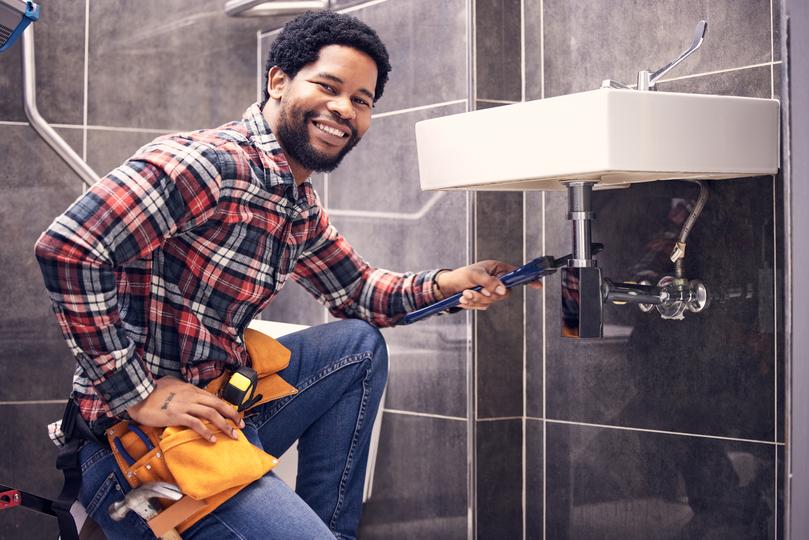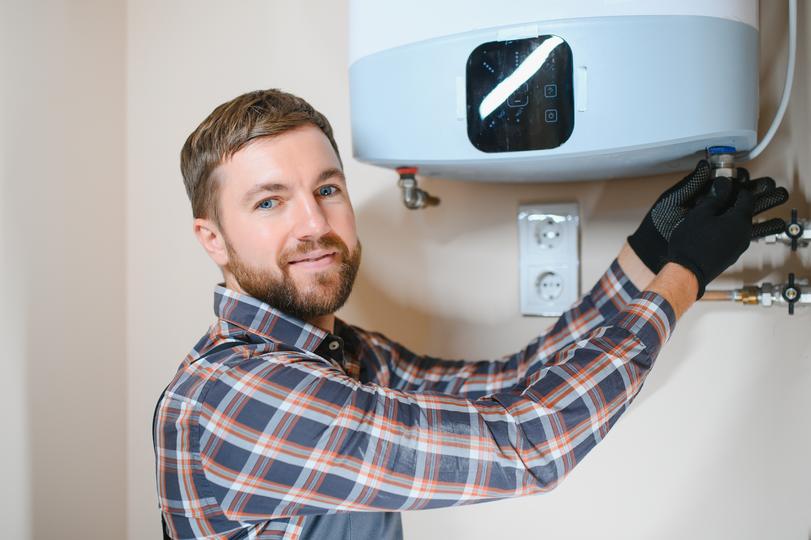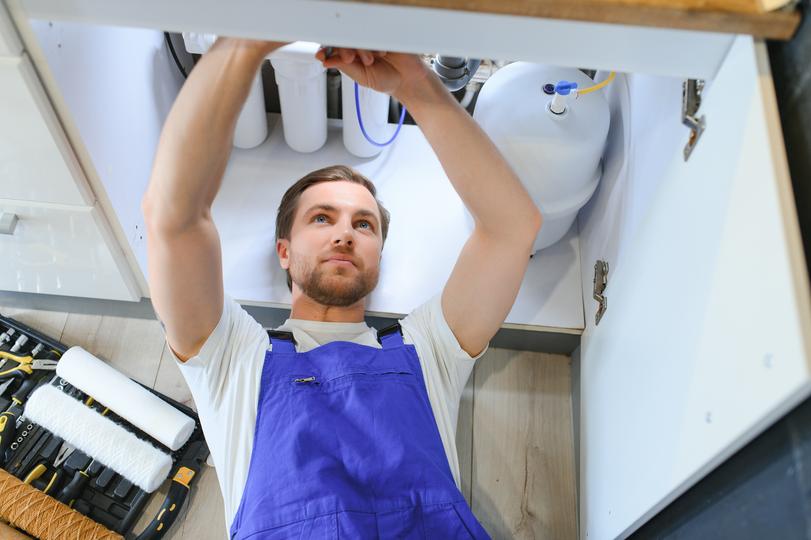Find Top Water Heater Repair Companies With Plumbyng
Fast, Reliable Water Heater Repair Services
Plumbyng helps you find experienced water heater repair companies near you in USA. Get free quotes, compare services, and find a reliable plumber for your water heater needs, whether you need repairs, maintenance, or a new installation.

Water Heater Repair Near Me
Need water heater repair services in your area? Browse our directory to find qualified and experienced plumbers near you in USA.
Finding The Right Water Heater Repair Service Is Easy
Plumbyng connects you with vetted plumbing professionals across USA who specialize in water heater repair and installation.

- Describe Your Water Heater Issue
- Tell us about your water heater problem, including any symptoms like leaks, no hot water, or unusual noises. The more details you provide, the more accurately we can match you with the right plumber.
- We Connect You With Local Plumbers
- We'll connect you with reputable plumbers in your area who specialize in water heater repair and have experience working on gas, electric, and tankless water heaters.
- Compare Quotes & Choose The Best Fit
- Review quotes, compare services, and choose the plumber who best meets your requirements and budget. We provide you with all the information you need to make an informed decision.
- Get Your Hot Water Back!
- With the right plumber on board, you can get your hot water restored quickly and efficiently.
Why Choose Plumbyng for Water Heater Repair?
The smarter way to find Water Heater Repair pros
Dealing with water heater issues can be frustrating and inconvenient. Plumbyng simplifies the process of finding qualified and reliable water heater repair services in USA. We connect you with experienced plumbers who can quickly and efficiently resolve your hot water problems. Here's why choosing Plumbyng is your best option: We take the stress out of finding the right plumbing contractors. Here's how:

- Vetted and Experienced Plumbers
- We carefully screen all plumbers in our directory to ensure they have the necessary licenses, insurance, and experience to handle water heater repairs effectively. You can have confidence knowing that you are choosing a qualified and trusted professional.
- Competitive Pricing and Transparent Quotes
- Receive multiple quotes from local plumbers, allowing you to easily compare prices and services. Our platform promotes fair and transparent pricing, so you'll know exactly what to expect before the work begins, helping you stay within your budget.
- Save Time and Minimize Disruption
- Finding a reliable plumber can be time-consuming, especially during a hot water emergency. Plumbyng streamlines the process, quickly connecting you with qualified professionals in your area. This saves you valuable time and minimizes the disruption caused by water heater problems.
- Expert Water Heater Repair
- Our listed plumbers have the expertise to repair all types of water heaters, including gas, electric, and tankless systems. They understand the intricacies of water heater operation and can quickly diagnose and fix a wide range of problems.
- Comprehensive Services
- Many of our plumbers offer additional services beyond water heater repair, such as plumbing repairs, drain cleaning, and other plumbing services. This makes it convenient to address multiple plumbing needs through a single trusted resource.
- Free and Easy to Use
- Finding a qualified water heater repair plumber on Plumbyng is completely free. There are no hidden fees or obligations. Get started today and find the perfect plumber for your needs.
Reliable Hot Water for Your Business
Commercial Water Heater Repair
Plumbyng connects businesses with experienced commercial plumbers for water heater repair and maintenance. We understand that consistent hot water is critical for many commercial operations. That's why we provide access to qualified professionals who can swiftly address any water heating issue and minimize disruption to your business. Our commercial plumbers specialize in a wide array of water heater services, including repair, maintenance, and replacement of large-capacity commercial water heaters. We also offer emergency water heater services.

Find trusted plumbers near you. Get multiple quotes for plumbing repair, installation, and maintenance services.

Get fast and reliable emergency plumbing services. We respond quickly to leaks, clogs, and other plumbing emergencies.

Experienced commercial plumbers for all your business needs. We handle installation, repair, and maintenance for all types of commercial plumbing systems.

Expert sewer line repair and maintenance services. We handle clogs, leaks, and other sewer line issues to keep your property functioning properly.

Upgrade to a tankless water heater for endless hot water and increased energy efficiency. We offer installation and maintenance services.

Professional water heater repair and maintenance services for all types of water heaters. We diagnose and fix problems quickly and efficiently.

Professional septic tank installation services for homes and businesses. We handle all aspects of the installation process, from planning to final inspection.

Upgrade your plumbing with our comprehensive whole house repiping services. We replace outdated pipes to improve efficiency, water pressure, and reduce leaks.

Clear stubborn clogs and buildup in your drains with our powerful hydro jetting services. We use high-pressure water to effectively clean and restore your plumbi
Get Your Hot Water Back Quickly
Residential Water Heater Repair
Plumbyng helps homeowners find trusted plumbers for all their residential water heater needs. Whether you're dealing with a faulty thermostat, pilot light issues, or sediment buildup, we can connect you with skilled plumbers who can quickly and effectively diagnose and fix your water heater problem. Find reliable plumbers near you, offering a variety of water heater services including installation of tankless water heaters and heat pump systems.

Find trusted plumbers near you. Get multiple quotes for plumbing repair, installation, and maintenance services.

Get fast and reliable emergency plumbing services. We respond quickly to leaks, clogs, and other plumbing emergencies.

Expert sewer line repair and maintenance services. We handle clogs, leaks, and other sewer line issues to keep your property functioning properly.

Upgrade to a tankless water heater for endless hot water and increased energy efficiency. We offer installation and maintenance services.

Professional water heater repair and maintenance services for all types of water heaters. We diagnose and fix problems quickly and efficiently.

Professional septic tank installation services for homes and businesses. We handle all aspects of the installation process, from planning to final inspection.

Upgrade your plumbing with our comprehensive whole house repiping services. We replace outdated pipes to improve efficiency, water pressure, and reduce leaks.

Clear stubborn clogs and buildup in your drains with our powerful hydro jetting services. We use high-pressure water to effectively clean and restore your plumbi
Is Your Water Heater Giving You Problems?
Find The Best Water Heater Repair Plumbers On Plumbyng!
Get free quotes, compare services, and restore your hot water quickly in USA.
Water Heater Repair Glossary
Water Heater
Tank Water Heater
Tankless Water Heater
Heat Pump Water Heater
Water Heater Repair
Water Heater Maintenance
Anode Rod
Sediment Buildup
Thermostat
Pilot Light
Dip Tube
Pressure Relief Valve
Gas Water Heater
Electric Water Heater
Water Heater Element
Water Heater Repair FAQs
How much does water heater repair cost?
- Type of water heater: Tank, tankless, or heat pump water heaters have different repair costs.
- Problem severity: A simple repair like replacing a faulty thermostat is less expensive than a major repair or replacement.
- Parts needed: The cost of replacement parts will vary depending on the specific component and brand.
- Plumber's labor rates: Labor costs vary by region and by the plumber's experience and expertise.
- Location of the water heater: If the water heater is located in a difficult-to-access location, this may increase the labor costs.
- Emergency service: Emergency service calls typically incur higher costs due to after-hours fees.
How to find a good water heater repair service near me?
- Check online reviews and ratings: Look for plumbers with consistently positive feedback from past customers.
- Verify licensing and insurance: Ensure the plumber is properly licensed and insured to protect you from liability.
- Ask for recommendations: Seek recommendations from friends, family, or neighbors.
- Get multiple quotes: Obtain detailed quotes from several plumbers and compare their prices and services before making a decision.
- Check for certifications: Plumbers with certifications from reputable organizations demonstrate expertise.
- Inquire about warranties: Find out what warranties are offered on parts and labor.
- Assess communication and professionalism: Choose a plumber who communicates clearly and responds promptly.
What are the signs my water heater needs repair?
- Lack of hot water: If you have little or no hot water, it points to a problem.
- Leaking water heater: Water leaking from the tank or pipes is a serious issue requiring immediate action.
- Strange noises: Unusual sounds like banging, popping, or rumbling suggest potential issues.
- Temperature inconsistencies: The water temperature fluctuates excessively.
- Rusty or discolored water: Rusty water suggests corrosion inside the tank.
- Increased energy bills: A water heater working harder than usual can impact energy consumption.
- Age of the water heater: Most water heaters last 8-12 years. Older units are more prone to failure.
- Frequent cycling: The water heater turns on and off more often than usual, possibly indicating a problem with the thermostat.
What causes a water heater to leak?
- Corrosion: Over time, the tank can corrode, especially at the bottom, leading to leaks.
- Cracked tank: A crack in the tank, usually due to pressure or temperature fluctuations, results in leaks.
- Faulty drain valve: A damaged drain valve can leak water.
- Loose or damaged pipes: Leaks can occur at connections between the tank and pipes.
- Pressure relief valve issues: A malfunctioning pressure relief valve may leak.
- Anode rod failure: The anode rod protects against corrosion; failure can lead to leaks.
How to fix a water heater?
How much does water heater replacement cost?
- Type of water heater: Tank, tankless, heat pump; costs vary significantly.
- Water heater size: Larger capacity water heaters cost more.
- Brand and features: Higher-end brands and features increase cost.
- Labor costs: These fluctuate based on location and plumber's rates.
- Installation complexity: Difficult installations add to the expense.
How long does a water heater last?
- Type of water heater: Tank water heaters typically last 8-12 years, while tankless water heaters can last much longer (20+ years).
- Water quality: Hard water causes mineral buildup, shortening lifespan.
- Maintenance: Regular maintenance extends the life of water heaters.
- Usage: Frequent and heavy use can reduce lifespan.
What size water heater do I need?
- Number of bathrooms and occupants.
- Frequency of hot water use.
- Typical water usage.
How to choose a water heater?
- Budget: Tank, tankless, and heat pump water heaters vary widely in cost.
- Energy Efficiency: Tankless and heat pump systems are more energy-efficient, reducing utility bills.
- Water Usage: Consider your household's or business' hot water needs.
- Space: Tankless units are more compact than tank water heaters.
- Installation Requirements: Some systems require specific venting and electrical requirements.
What causes a water heater to make noise?
- Sediment buildup: Minerals accumulate at the bottom of the tank, causing rumbling or popping sounds.
- Corrosion: Rusting of the tank can produce banging noises.
- Expansion and contraction: Temperature changes can cause expansion and contraction of the tank resulting in popping sounds.
- Loose components: Loose parts can vibrate and create noises.
What is an anode rod?
How often should I flush my water heater?
How do I drain a water heater?
How to check your water heater's pressure relief valve?
What is a heat pump water heater?
What are the different types of water heaters?
- Tank water heaters: Store hot water in a tank, offering a readily available hot water supply, but with lower energy efficiency.
- Tankless water heaters: Heat water on demand, providing endless hot water, but have higher initial costs.
- Heat pump water heaters: Highly energy-efficient, using a heat pump to transfer heat from the air to water.
What is a gas water heater pilot light?
How long does a tankless water heater last?
What are the pros and cons of tankless water heaters?
- Endless hot water: Provides a continuous supply of hot water.
- Energy efficiency: Heats water only when needed, reducing energy costs.
- Space savings: Compact design, saving space compared to tank water heaters.
- Longer lifespan: Generally last longer than tank water heaters.
However, tankless water heaters may also have disadvantages:
- Higher initial cost: Tankless systems generally have a higher upfront cost.
- Higher energy costs for multiple uses: While more energy-efficient overall, using multiple hot water appliances concurrently can lead to higher energy consumption.
- May not be suitable for all climates: Extremely cold climates can affect their operation.
What causes a water heater to not heat water?
- Faulty thermostat: The thermostat controls the water temperature, so a malfunction will prevent heating.
- Bad heating element: The element is the heating component in electric water heaters. Failure prevents heating.
- Gas supply issue: For gas water heaters, check the gas supply, pilot light, and burner. A malfunction in this area will prevent water heating.
- Thermostat issues: A malfunctioning thermostat will prevent heating.
- Sediment buildup: Excessive sediment at the bottom of a tank water heater can reduce efficiency and prevent sufficient heating.
- Other electrical or gas-related issues: Several electrical or gas-related problems can prevent the water heater from working correctly.
What is a heat pump water heater?
How do I know if my water heater needs to be replaced?
- Age: Tank water heaters typically last 8-12 years; consider replacement if it's older.
- Frequent repairs: Frequent repairs suggest the water heater is nearing the end of its life and frequent repairs will eventually be more expensive than replacement.
- Leaks: A leaking water heater is a serious issue requiring immediate attention.
- Poor performance: If the unit doesn't supply sufficient hot water or struggles to heat the water.
What are the benefits of a tankless water heater?
- Endless hot water: They provide a continuous supply of hot water.
- Energy efficiency: They heat water only when needed, leading to lower utility bills.
- Long lifespan: They tend to have a significantly longer lifespan compared to tank water heaters.
- Compact size: Their design takes up less space.
What is the best type of water heater?
How much does water heater repair cost?
- Type of water heater: Tank, tankless, or heat pump water heaters have different repair costs.
- Problem severity: A simple repair like replacing a faulty thermostat is less expensive than a major repair or replacement.
- Parts needed: The cost of replacement parts will vary depending on the specific component and brand.
- Plumber's labor rates: Labor costs vary by region and by the plumber's experience and expertise.
- Location of the water heater: If the water heater is located in a difficult-to-access location, this may increase the labor costs.
- Emergency service: Emergency service calls typically incur higher costs due to after-hours fees.
How to find a good water heater repair service near me?
- Check online reviews and ratings: Look for plumbers with consistently positive feedback from past customers.
- Verify licensing and insurance: Ensure the plumber is properly licensed and insured to protect you from liability.
- Ask for recommendations: Seek recommendations from friends, family, or neighbors.
- Get multiple quotes: Obtain detailed quotes from several plumbers and compare their prices and services before making a decision.
- Check for certifications: Plumbers with certifications from reputable organizations demonstrate expertise.
- Inquire about warranties: Find out what warranties are offered on parts and labor.
- Assess communication and professionalism: Choose a plumber who communicates clearly and responds promptly.
What are the signs my water heater needs repair?
- Lack of hot water: If you have little or no hot water, it points to a problem.
- Leaking water heater: Water leaking from the tank or pipes is a serious issue requiring immediate action.
- Strange noises: Unusual sounds like banging, popping, or rumbling suggest potential issues.
- Temperature inconsistencies: The water temperature fluctuates excessively.
- Rusty or discolored water: Rusty water suggests corrosion inside the tank.
- Increased energy bills: A water heater working harder than usual can impact energy consumption.
- Age of the water heater: Most water heaters last 8-12 years. Older units are more prone to failure.
- Frequent cycling: The water heater turns on and off more often than usual, possibly indicating a problem with the thermostat.
What causes a water heater to leak?
- Corrosion: Over time, the tank can corrode, especially at the bottom, leading to leaks.
- Cracked tank: A crack in the tank, usually due to pressure or temperature fluctuations, results in leaks.
- Faulty drain valve: A damaged drain valve can leak water.
- Loose or damaged pipes: Leaks can occur at connections between the tank and pipes.
- Pressure relief valve issues: A malfunctioning pressure relief valve may leak.
- Anode rod failure: The anode rod protects against corrosion; failure can lead to leaks.
How to fix a water heater?
How much does water heater replacement cost?
- Type of water heater: Tank, tankless, heat pump; costs vary significantly.
- Water heater size: Larger capacity water heaters cost more.
- Brand and features: Higher-end brands and features increase cost.
- Labor costs: These fluctuate based on location and plumber's rates.
- Installation complexity: Difficult installations add to the expense.
How long does a water heater last?
- Type of water heater: Tank water heaters typically last 8-12 years, while tankless water heaters can last much longer (20+ years).
- Water quality: Hard water causes mineral buildup, shortening lifespan.
- Maintenance: Regular maintenance extends the life of water heaters.
- Usage: Frequent and heavy use can reduce lifespan.
What size water heater do I need?
- Number of bathrooms and occupants.
- Frequency of hot water use.
- Typical water usage.
How to choose a water heater?
- Budget: Tank, tankless, and heat pump water heaters vary widely in cost.
- Energy Efficiency: Tankless and heat pump systems are more energy-efficient, reducing utility bills.
- Water Usage: Consider your household's or business' hot water needs.
- Space: Tankless units are more compact than tank water heaters.
- Installation Requirements: Some systems require specific venting and electrical requirements.
What causes a water heater to make noise?
- Sediment buildup: Minerals accumulate at the bottom of the tank, causing rumbling or popping sounds.
- Corrosion: Rusting of the tank can produce banging noises.
- Expansion and contraction: Temperature changes can cause expansion and contraction of the tank resulting in popping sounds.
- Loose components: Loose parts can vibrate and create noises.
What is an anode rod?
How often should I flush my water heater?
How do I drain a water heater?
How to check your water heater's pressure relief valve?
What is a heat pump water heater?
What are the different types of water heaters?
- Tank water heaters: Store hot water in a tank, offering a readily available hot water supply, but with lower energy efficiency.
- Tankless water heaters: Heat water on demand, providing endless hot water, but have higher initial costs.
- Heat pump water heaters: Highly energy-efficient, using a heat pump to transfer heat from the air to water.
What is a gas water heater pilot light?
How long does a tankless water heater last?
What are the pros and cons of tankless water heaters?
- Endless hot water: Provides a continuous supply of hot water.
- Energy efficiency: Heats water only when needed, reducing energy costs.
- Space savings: Compact design, saving space compared to tank water heaters.
- Longer lifespan: Generally last longer than tank water heaters.
However, tankless water heaters may also have disadvantages:
- Higher initial cost: Tankless systems generally have a higher upfront cost.
- Higher energy costs for multiple uses: While more energy-efficient overall, using multiple hot water appliances concurrently can lead to higher energy consumption.
- May not be suitable for all climates: Extremely cold climates can affect their operation.
What causes a water heater to not heat water?
- Faulty thermostat: The thermostat controls the water temperature, so a malfunction will prevent heating.
- Bad heating element: The element is the heating component in electric water heaters. Failure prevents heating.
- Gas supply issue: For gas water heaters, check the gas supply, pilot light, and burner. A malfunction in this area will prevent water heating.
- Thermostat issues: A malfunctioning thermostat will prevent heating.
- Sediment buildup: Excessive sediment at the bottom of a tank water heater can reduce efficiency and prevent sufficient heating.
- Other electrical or gas-related issues: Several electrical or gas-related problems can prevent the water heater from working correctly.
What is a heat pump water heater?
How do I know if my water heater needs to be replaced?
- Age: Tank water heaters typically last 8-12 years; consider replacement if it's older.
- Frequent repairs: Frequent repairs suggest the water heater is nearing the end of its life and frequent repairs will eventually be more expensive than replacement.
- Leaks: A leaking water heater is a serious issue requiring immediate attention.
- Poor performance: If the unit doesn't supply sufficient hot water or struggles to heat the water.
What are the benefits of a tankless water heater?
- Endless hot water: They provide a continuous supply of hot water.
- Energy efficiency: They heat water only when needed, leading to lower utility bills.
- Long lifespan: They tend to have a significantly longer lifespan compared to tank water heaters.
- Compact size: Their design takes up less space.